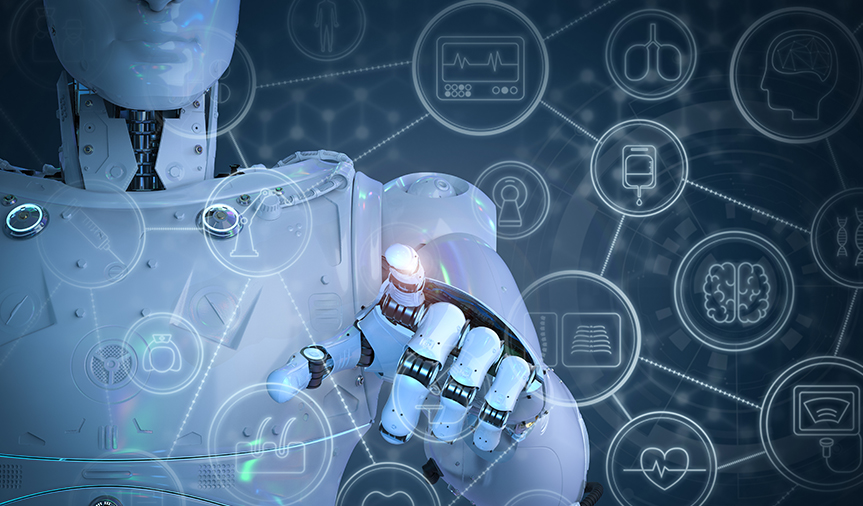The healthcare industry is changing quickly because of artificial intelligence (AI) as a service, which presents exciting opportunities for innovation across a range of sectors. Artificial intelligence (AI) is transforming the way we prevent, diagnose, and treat diseases. Applications include robotic surgery, customized medicine, early disease diagnosis, and drug development.
Here’s An Overview Of How AI As A Service Is Impacting Healthcare Innovation:

1. Initial Diagnosis & Clinical Decision Assistance:
Artificial intelligence (AI) has revolutionized the way medical image analysis is done. MRIs, CT scans, and X-rays can now be examined quickly and accurately, helping to detect illnesses like cancer and heart disease early on.
In medical records, machine learning finds patterns. Precision medicine and risk identification can be achieved through the analysis of genetic data, wearable technology, and electronic health records.
Automatic triage and symptom screening are offered by chatbots. By enhancing accessibility and lessening the load on emergency rooms, patients can obtain preliminary evaluations and recommendations for additional treatment.
2. Personalized Medicine & Treatment:
AI can customize treatment strategies for particular patients. AI as a Service helps customize treatment plans for complicated diseases like diabetes, cancer, and other conditions by taking into account a patient’s genetic composition, medical history, and lifestyle choices.
There is an acceleration in drug discovery and development. AI systems evaluate enormous volumes of data to find and enhance effective medication candidates.
Patients and caregivers can benefit from virtual aides. AI-powered companions provide reminders, medication administration, and emotional support, therefore increasing patient engagement and adherence to treatment.
3. Less Invasive Techniques & Robotic Surgery:
AI helps robotic surgeons execute difficult procedures: AI as a service helps surgeons perform delicate surgeries with more accuracy and tremor control, reducing risks and increasing patient outcomes.
Rehabilitation programs driven by AI: Patients are guided in their physiotherapy and recuperation processes with the help of customized exercises and feedback provided by AI-powered tools.
4. Efficiency In Operations & Administrative Work:
Executive duties are automated by AI as a service: AI streamlines appointment scheduling, medical record transcription, and insurance claim management, freeing up healthcare workers’ time to care for patients.
Allocating resources is optimized via predictive analytics: Artificial Intelligence predicts patient volume, staffing needs, and possible medication shortages, allowing for proactive scheduling and resource allocation. Healthcare innovation is being greatly aided by artificial intelligence (AI), which is raising standards for effectiveness, accessibility, and quality of treatment.
The Healthcare Industry Is Changing In The Following Ways Thanks To AI As A Service:

Diagnostics & Predictive Analytics:
Artificial intelligence algorithms can evaluate intricate diagnostic pictures, such as MRIs, CT scans, and X-rays, frequently more quickly and occasionally more precisely than human radiologists. Through data analysis and pattern recognition, AI as a service can forecast patient outcomes and potentially lead to early therapies for illnesses such as diabetes, heart failure, or sepsis.
Clinical Decision Support:
AI algorithms examine large datasets to assist healthcare practitioners with patient diagnosis and treatment. By giving physicians access to up-to-date medical information, decision support systems enable them to make better judgments in real time.
Personalized Medicine:
AI as a service evaluates clinical, genetic, and lifestyle information to provide individualized treatment regimens for each patient. Early illness identification is made possible by predictive analytics, which makes proactive and individualized therapies possible.
Precision Medicine:
AI works to determine which therapies are most successful for specific patients by evaluating enormous databases of genetic data, resulting in individualized care regimens.
Medication Discovery & Development:
By evaluating genetic and molecular data, forecasting possible medication candidates, and refining clinical trial designs, AI expedites the process of finding new drugs. It expedites and lowers the price of introducing novel medications to the market.
Disease Treatment:
Artificial intelligence (AI)-enabled devices that monitor chronic illnesses and give patients and physicians access to real-time data enable improved treatment through prompt interventions.
Effectiveness Of Operations:
AI streamlines processes in healthcare facilities, ensuring that resources are spent effectively by monitoring supply chains and setting up patient visits.
Robot-Assisted Surgery:
Robots with artificial intelligence (AI) improve surgical accuracy and allow for less intrusive operations. Patients recover from difficult procedures faster because surgeons can execute them more accurately.
Wearables & Health Monitoring:
Artificial intelligence evaluates information from sensors and wearables to track patients’ health in real-time. The load on healthcare institutions is lessened when abnormalities are discovered early and may be used to take proactive measures.
The Use Of Natural Language Processing (NLP) In Medical Records:
NLP algorithms can extract important information from unstructured medical data, including literature and notes from doctors. It increases the usability of data, makes research easier, and boosts the effectiveness of healthcare procedures.
Digital Medical Assistants:
Virtual assistants with AI capabilities help patients, respond to inquiries, and remind patients to take their medications. Increases patient participation, adherence to treatment protocols, and overall healthcare satisfaction.
Predictive Healthcare:
AI as a service uses pattern recognition to anticipate disease outbreaks or critical medical situations involving specific patients. Genetics, lifestyle, and environmental variables may all be used by machine learning algorithms to estimate risk and predict future health problems. By assisting in early detection and treatment, these forecasts can significantly lower rates of morbidity and death.
Clinical Studies:
AI can assist in matching eligible individuals more quickly, which lowers the time and expense associated with recruiting new patients for clinical studies.
Digital Medical Assistants:
Virtual assistants driven by artificial intelligence (AI) can serve as a first line of easily available assistance for patients by offering answers to questions about health, reminders for medications, and nutritional advice.
Telemedicine:
By adding AI’s ability to analyze images, evaluate symptoms, and interpret language, telemedicine solutions and remote care are improved.
Mental Health:
Cognitive behavioral therapy and support for mental health are provided via AI-driven applications and therapy bots, providing a means of care for those who might not have easy access to mental health specialists.
Population Health Management:
To spot patterns, anticipate illness outbreaks, and allocate resources as efficiently as possible, AI as a service analyzes big datasets. Gives medical professionals the ability to carry out preventative actions and enhance population health in general.
Data Privacy & Cybersecurity:
By identifying and averting cyberattacks, AI improves cybersecurity in the healthcare industry. Protects private patient information by enhancing data privacy with sophisticated encryption and access restrictions.
Smart Health Records:
AI streamlines patient data storage and retrieval, reducing time and complexity. AI-powered solutions can quickly and conveniently retrieve patient medical histories, manage health records, and give healthcare practitioners the critical information they need.
Health Record Analysis:
Available as a service, AI systems automatically process and examine enormous volumes of electronic health data, drawing out important information to support clinical judgment.
Physical therapy & rehabilitation:
AI-driven rehabilitation equipment personalizes treatment regimens according to each patient’s development. Makes physical therapy programs more effective and improves the results of recovery.
Image Analysis & Radiology:
Medical pictures from X-rays, CT scans, and MRIs may be analyzed faster and more precisely by machine learning algorithms than by human doctors, which reduces effort and improves accurate and timely diagnosis.
Enhancing Access In Hard-to-Reach Places:
By offering remote diagnostics and health monitoring services, AI as a service can close the healthcare gap in these difficult-to-reach places. In places where there is a dearth of medical personnel, it can offer crucial healthcare services.
Helping Aging Populations:
AI as a service may help the elderly by detecting abnormal behavior patterns, such as falls or indications of illnesses like dementia, and assisting with prescription administration, health monitoring, and safety.
Obstacles & Things to Think About:

Data Privacy & Security:
Strict data governance and security measures are needed to safeguard private patient information while utilizing it for AI-driven insights.
Algorithmic Bias & Fairness:
In order to prevent the continuation of current healthcare inequities, AI algorithms must make suggestions that are impartial and equitable.
Availability & Cost:
It is still very difficult to close the digital gap and guarantee that all communities have fair access to AI-powered healthcare technology.
In Conclusion

While AI as a service has enormous promise for innovative healthcare, it is crucial to develop it responsibly and apply ethics to its use. ITG can contribute to the creation of a healthier future where everyone benefits from precise diagnostics, individualized treatment, and effective care delivery by tackling these issues and appropriately utilizing AI in healthcare.
Keep in mind that this is just the initial point. You may remain up to speed on the fast-changing environment of AI-driven healthcare innovation by investigating particular implementations of AI as a service in various healthcare sectors and keeping up with new research and trends.
A paradigm shift toward more effective, individualized, and patient-centered treatment is facilitated by the use of AI as a service in the healthcare industry. AI’s contribution to healthcare innovation is expected to grow as a result of its ability to address some of the most difficult problems facing the sector.